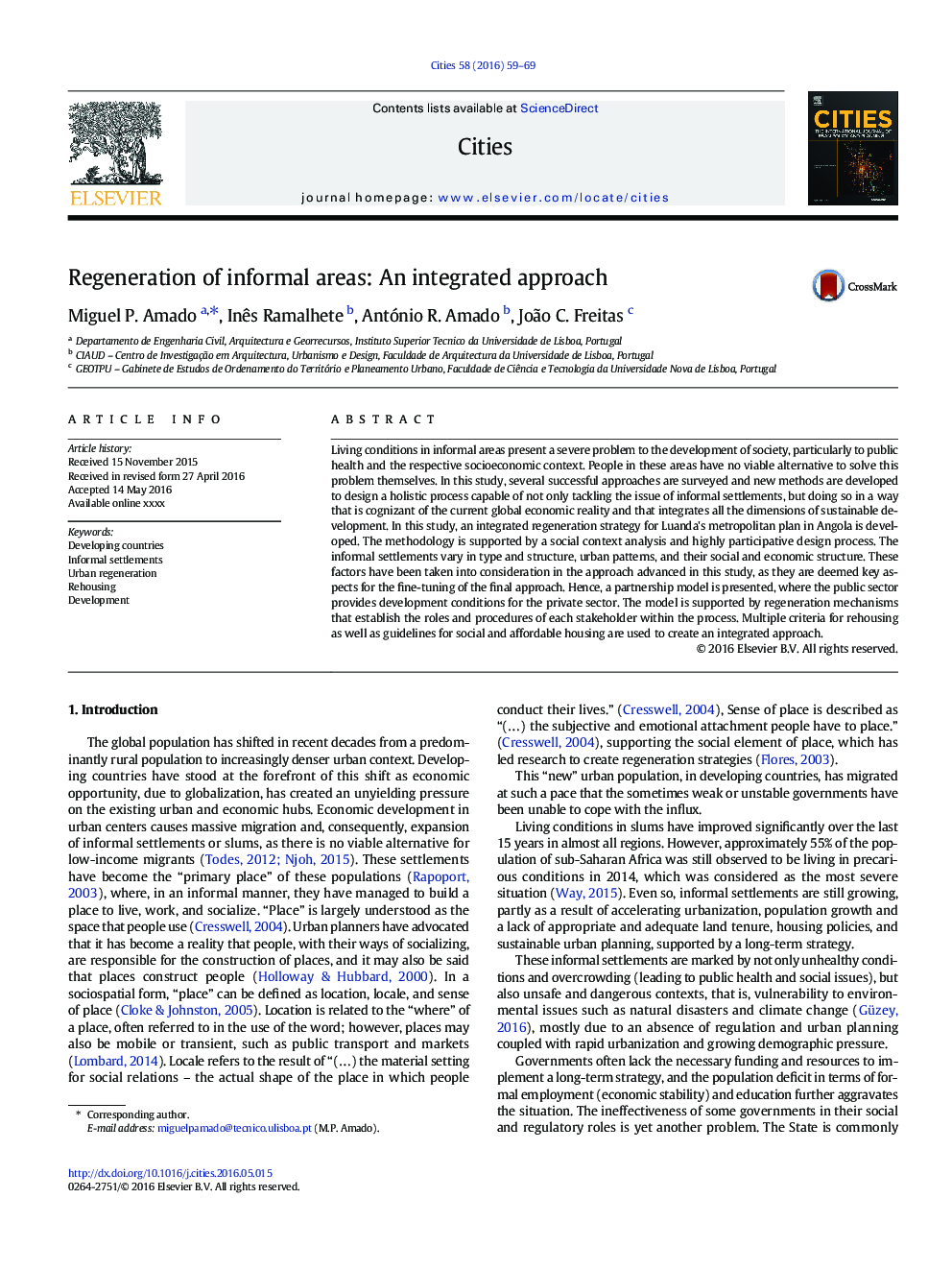| کد مقاله | کد نشریه | سال انتشار | مقاله انگلیسی | نسخه تمام متن |
|---|---|---|---|---|
| 7417935 | 1482338 | 2016 | 11 صفحه PDF | دانلود رایگان |
عنوان انگلیسی مقاله ISI
Regeneration of informal areas: An integrated approach
ترجمه فارسی عنوان
بازسازی مناطق غیر رسمی: یک رویکرد یکپارچه
دانلود مقاله + سفارش ترجمه
دانلود مقاله ISI انگلیسی
رایگان برای ایرانیان
کلمات کلیدی
کشورهای در حال توسعه، شهرک های غیر رسمی، بازسازی شهری، تیراندازی، توسعه،
ترجمه چکیده
شرایط زندگی در مناطق غیر رسمی مشکلی جدی برای توسعه جامعه، به ویژه در زمینه بهداشت عمومی و زمینه های اجتماعی و اقتصادی مربوطه است. افراد در این مناطق جایگزین مناسب برای حل این مشکل نیستند. در این تحقیق، چندین روش موفق در نظر گرفته شده است و روش های جدیدی برای طراحی فرایند جامع است که قادر است نه تنها مسئله سکونت غیر رسمی را حل کند، بلکه این کار را به گونه ای انجام می دهد که واقعیت اقتصادی فعلی جهانی را درک می کند و تمام ابعاد توسعه پایدار. در این مطالعه استراتژی بازسازی یکپارچه برای طرح شهری لواندا در آنگولا توسعه یافته است. این روش توسط یک تجزیه و تحلیل زمینه اجتماعی و فرایند طراحی بسیار مشارکتی پشتیبانی می شود. اسکان غیر رسمی در نوع و ساختار، الگوهای شهری و ساختار اجتماعی و اقتصادی آنها متفاوت است. این عوامل در رویکرد پیشرفته در این مطالعه مورد توجه قرار گرفته اند، زیرا آنها جنبه های کلیدی برای اصلاح رویکرد نهایی را در نظر گرفته اند. از این رو، یک مدل مشارکتی ارائه می شود، جایی که بخش دولتی شرایط توسعه را برای بخش خصوصی فراهم می کند. این مدل از طریق مکانیسم های بازسازی پشتیبانی می شود که نقش و روش های هر متولی را در فرایند ایجاد می کند. معیارهای متعدد برای تدارک و همچنین دستورالعمل برای مسکن اجتماعی و مقرون به صرفه برای ایجاد رویکرد یکپارچه استفاده می شود.
موضوعات مرتبط
علوم انسانی و اجتماعی
مدیریت، کسب و کار و حسابداری
گردشگری، اوقات فراغت و مدیریت هتلداری
چکیده انگلیسی
Living conditions in informal areas present a severe problem to the development of society, particularly to public health and the respective socioeconomic context. People in these areas have no viable alternative to solve this problem themselves. In this study, several successful approaches are surveyed and new methods are developed to design a holistic process capable of not only tackling the issue of informal settlements, but doing so in a way that is cognizant of the current global economic reality and that integrates all the dimensions of sustainable development. In this study, an integrated regeneration strategy for Luanda's metropolitan plan in Angola is developed. The methodology is supported by a social context analysis and highly participative design process. The informal settlements vary in type and structure, urban patterns, and their social and economic structure. These factors have been taken into consideration in the approach advanced in this study, as they are deemed key aspects for the fine-tuning of the final approach. Hence, a partnership model is presented, where the public sector provides development conditions for the private sector. The model is supported by regeneration mechanisms that establish the roles and procedures of each stakeholder within the process. Multiple criteria for rehousing as well as guidelines for social and affordable housing are used to create an integrated approach.
ناشر
Database: Elsevier - ScienceDirect (ساینس دایرکت)
Journal: Cities - Volume 58, October 2016, Pages 59-69
Journal: Cities - Volume 58, October 2016, Pages 59-69
نویسندگان
Miguel P. Amado, Inês Ramalhete, António R. Amado, João C. Freitas,
